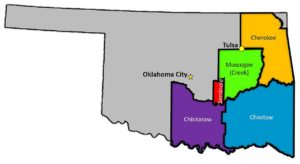State must recognize historic tribal boundaries
The Court begins, “On the far end of the Trail of Tears was a promise” to the Five Tribes of land in Oklahoma in exchange for giving up their ancestral lands in Georgia and Florida. The Court ruled today this land is still “Indian country.” (Read the decision here.)
The practical consequence is that state authorities couldn’t prosecute Jimcy McGirt, a member of the Seminole Nation, so his state court conviction is invalid. Tribal members who commit “major crimes” (defined by federal statute) in “Indian country” must be prosecuted in federal courts.
Oklahoma, and the U.S. Solicitor General (representing the Trump administration), argued the site of McGirt’s offenses had ceased to be “Indian country.” The Court disagreed, saying that while Congress broke many promises to the Oklahoma tribes, it never went as far as disestablishing the reservations created by 19th century treaties.
It works roughly like this: “Indian country” is, in effect, federal land where states lack authority over tribal members. In most cases, Congress has delegated prosecution of minor offenses to tribal authorities, but “major crimes” are prosecuted in federal courts.
North America’s original inhabitants came under federal jurisdiction in various ways; some by conquest, others under treaties. But all eventually came under federal control, and once they did, the federal government assumed the role of protecting them from often-hostile surrounding communities — and also from state governments, which historically tended to be hostile toward tribal interests. Thus, disputes between tribes and states tend to be litigious and can get quite contentious.

The gist of the McGinty decision is that Oklahoma’s “Indian country” is far larger than the state authorities have been willing to recognize, and now they have to recognize it. The outcome is a major legal win for the tribes, and for Native Americans in general, not least because the opinion doesn’t beat around the bushes. Its conclusion that nearly half the state of Oklahoma is “Indian country,” including most of Tulsa, is unequivocal.
It’s also a great moral victory for Native Americans, given the long and black history of efforts to take their land, eliminate tribal status and reservations, and destroy their special status under American law — a status given them in trade for this continent.
The McGinty ruling doesn’t mean the tribes own Tulsa; a great deal of land in “Indian country” is owned by non-Indians, especially in Oklahoma, where Native Americans today comprise only about 15% of the state’s population. And strictly speaking, it affects only criminal jurisdiction. But it does probably mean tribal governments can assert their authority in those areas in other respects as well. This authority, though, only applies to tribal members; tribal governments generally have no authority over non-tribal members, even in “Indian country.” That authority belongs to the federal government.
(The Supreme Court, in a subsequent decision, narrowed the criminal jurisdiction impact of McGinty by ruling that state authorities can prosecute non-Indian perpetrators even if the victim is an Indian. McGinty created a void because federal officials said they lacked resources to do so. See story
here.)
The decision unequivocally states that only Congress can create Indian reservations, and only Congress can destroy them. Past practices by the state, no matter how long they went on, don’t count. The Constitution expressly gives Congress suzerainty over tribes; and Congress — not the executive branch, or the courts — can do whatever it wants with them. For a long time, it pushed them around, took their lands, even stole their children from them as part of an effort to force them to “assimilate” into America’s dominant culture. Since about the 1930s, though, the tendency has been for Congress to give tribes greater autonomy and more self-government.
Although the term “tribal sovereignty” often comes up, America’s native tribes aren’t sovereign states, and can’t make treaties with foreign governments (e.g., no Chinese military bases on reservations). Indian reservations are federal land, similar to military bases. The tribes exist in the form of persons and cultures, of course, but as legal entities under U.S. sovereignty they’re creatures of federal law existing only because, and as long as, Congress gives them that status.
It’s also important to understand that tribal rights belong to tribal entities, not individuals. Thus, for example, treaty fishing rights are tribal rights, not the property of individual tribal fishermen. The same is true of other treaty rights (e.g., water rights under the Winters doctrine). If you’re interested in learning more about Indian law,
this book is a good resource.

